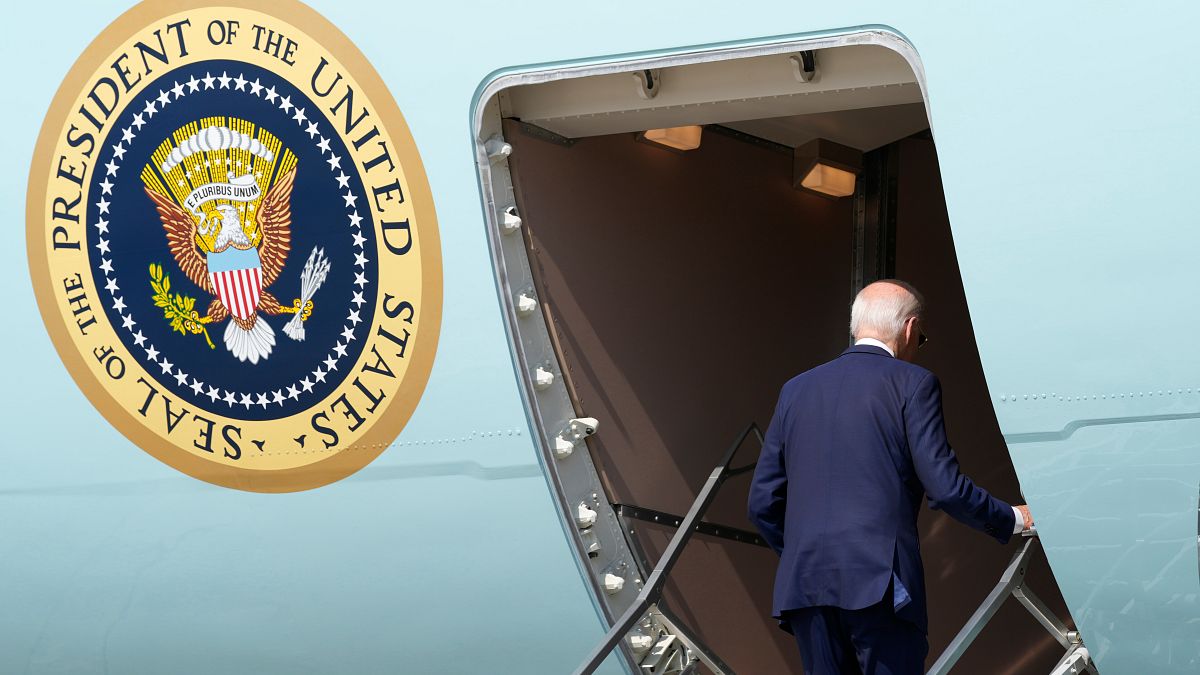The president has dropped his 2024 bid after weeks of pressure following a disastrous debate performance.
After weeks of pressure to reconsider his re-election campaign, US President Joe Biden has announced he is withdrawing as a candidate.
In a letter on his social media account on X Sunday, Biden said the decision "is in the best interest of my party and the country".
Biden made clear he will serve out the remainder of his term, which expires in January 2025, and immediately endorsed Vice President Kamala Harris.
"My very first decision as the party nominee in 2020 was to pick Kamala Harris as my Vice President," he wrote. "And it’s been the best decision I’ve made. Today I want to offer my full support and endorsement for Kamala to be the nominee of our party this year. Democrats — it’s time to come together and beat Trump. Let’s do this."
Other names have been mentioned as potential replacements for Biden atop the Democratic ticket, but any prospective candidate would have to provide a clear rationale for a challenge against a black woman who would be the US's first female president.
Donald Trump reacted to the news with a message on his bespoke social media platform, Truth Social, in which he said the "crooked" Biden "was not fit to run for president, and is certainly not fit to serve - and never was!"
"We will suffer greatly because of his presidency, but we will remedy the damage he has done very quickly," Trump wrote. "MAKE AMERICA GREAT AGAIN!"
The end of an era
Demands for the 81-year-old Biden to drop out surged after a televised debate with Trump on 27 June in which the president appeared physically and cognitively exhausted.
He struggled to rebut his opponent's often false claims, gave rambling answers of his own, and at times stared blankly into space.
After the on-air debacle, Biden's allies briefed the media that he had been suffering from a cold, and he delivered a higher-energy speech at a campaign rally to regain the initiative.
However, in subsequent interviews and public appearances meant to reassure voters and his own party that he was fit to stand, Biden frequently appeared tired.
As a result, more and more prominent Democrats began either declining to speculate on his future or explicitly calling for him to stand aside, even as others insisted they were behind him.
A particularly dire moment came at a Washington summit marking the 75th anniversary of NATO. While Biden proved able to hold an extended press conference in which he held forth on a range of complex policy areas, he also referred to Ukrainian President Volodymyr Zelenskyy as "President Putin" and his own vice president, Kamala Harris, as "Vice President Trump".
As it became clear that his effort to stem the tide was not succeeding, some of the party's most senior figures — including former House of Representatives speaker Nancy Pelosi — stopped short of calling on him to step down but began offering more equivocal answers the media when asked what he should do.
A major intervention came from George Clooney, one of the Democrats' biggest donors, who wrote in the New York Times that "the one battle (Biden) cannot win is the fight against time".
"It’s devastating to say it, but the Joe Biden I was with three weeks ago at the fund-raiser was not the Joe “big F-ing deal” Biden of 2010. He wasn’t even the Joe Biden of 2020. He was the same man we all witnessed at the debate."
Over the edge
Even the attempted assassination of Donald Trump before the Republican convention did not dislodge the Biden story from the news cycle or stop the slow but steady drip of Democrats calling on him to drop out.
Midway through the convention where Trump accepted the nomination, it was announced that Biden had been diagnosed with COVID-19, forcing him to go to his home in Delaware to recover.
Shortly after that news broke, Black Entertainment Television broadcast a pre-recorded interview in which the president appeared strikingly unwell and struggled to remember the name of his defence secretary, Lloyd Austin, instead referring to him as "the black guy".
With the Republican convention over, the Democratic Party's central machine appeared to be moving ahead with a plan to have Biden's nomination confirmed via a virtual roll call vote in advance of their own party's gathering in Chicago in September, thus forcing delegates to cast their votes for him as soon as possible.
But before that plan could be put into action, Biden announced he was dropping out.
What now?
It has not yet been announced precisely what will happen at the Democratic convention or how Biden's successor as nominee will be chosen.
The obvious path is for the party to nominate VP Harris, putting her in line to be the US's first woman president. She has made more and more appearances on the campaign trail in recent months, and her polling numbers relative to Biden and Trump have improved of late.
Other popular and well-known Democrats have also been suggested as potential nominees, among them California Governor Gavin Newsom and Michigan Governor Gretchen Whitmer.
But after several painful weeks spent pressuring Biden to drop out, it is not yet clear if anyone in the party will challenge Harris and risk another internal conflict.












